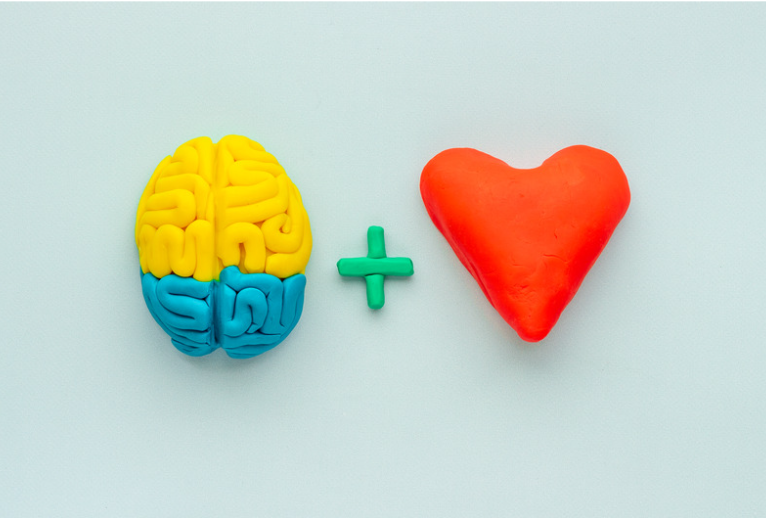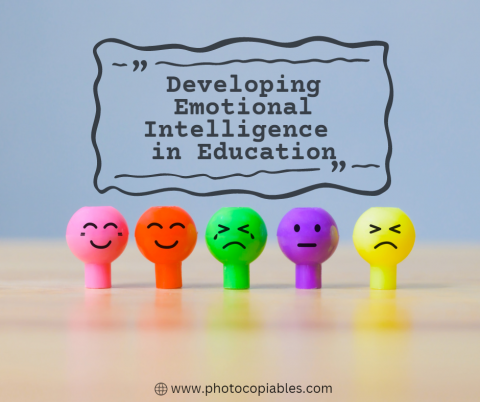Emotional Intelligence (EI) (AKA emotional quotient or EQ) is a term that refers to the ability to recognize, understand, and regulate emotions in oneself and others. It is different from cognitive intelligence (IQ), which measures cognitive abilities such as memory, problem-solving, and language skills. While IQ is important for academic success, EI is equally important for success in professional and personal life. Individuals who are high in EI are more likely to perform well in the workplace, as they can handle stress, communicate effectively, and manage conflicts. They are also more likely to have better relationships with peers and teachers, and less likely to engage in problem behaviors such as substance abuse and aggression.

Essential Components of Emotional Intelligence
EI consists of five essential components: self-awareness, self-regulation, motivation, empathy, and social skills. These components are interrelated and influence each other.
- Self-awareness is the ability to recognize and understand one's own emotions, thoughts, and behaviours. It involves being able to accurately identify and describe one's emotions, as well as understanding the impact that these emotions have on one's behaviour and interactions with others.
- Self-regulation is the ability to manage and regulate one's own emotions, thoughts, and behaviours. It involves being able to control impulses, cope with stress, and adapt to changing situations.
- Motivation is the ability to use emotions to drive and guide behaviour toward achieving personal and professional goals. It involves being able to set goals, pursue them with enthusiasm, and overcome obstacles.
- Empathy is the ability to recognize and understand the emotions of others and respond to them appropriately. It involves being able to put oneself in another person's shoes and see things from their perspective.
- Social skills are the ability to communicate effectively, build and maintain positive relationships, and work well in teams. They involve being able to listen actively, express oneself clearly, cooperate with others, and resolve conflicts.
Two Critical Components of Emotional Intelligence
Self-awareness and empathy are two critical components of EI that are important for developing social-emotional competencies that are essential for success in both personal and professional life. Social-emotional competencies are the skills that enable individuals to interact effectively with others in various contexts. They include skills such as self-confidence, self-esteem, resilience, optimism, compassion, respect, responsibility, and integrity.
Self-awareness enables individuals to recognize and regulate their emotions, which can help them make better decisions and navigate challenging situations more effectively. For example, if a student is feeling frustrated or overwhelmed by a difficult assignment or a personal problem, they can use their self-awareness to recognize these emotions and take steps to regulate them. They can use strategies such as positive self-talk, cognitive reappraisal, or mindfulness-based stress reduction to calm themselves down or change their perspective on the situation. They can also seek support from a teacher or counsellor if they need help.
Empathy enables individuals to understand the needs and perspectives of their students and respond to them in a way that is supportive and effective. For example, if a student is struggling with a particular subject or a personal issue, a teacher who is highly empathetic may be better able to understand the root causes of the student's difficulty and provide them with the appropriate support and resources. They may also be able to adjust their teaching style or pace to suit the student's needs.
Overcoming Biased Thoughts and Behaviours
 In some cases, biased thoughts and behaviours can be seen as beneficial. Biases can allow people to make quick decisions when time is limited and information is incomplete. They can also help people better understand complex information by providing a framework for organizing and interpreting data. However, it's important to be aware of biases and their potential negative impacts on individuals and groups, including perpetuating discrimination and limiting opportunities.
In some cases, biased thoughts and behaviours can be seen as beneficial. Biases can allow people to make quick decisions when time is limited and information is incomplete. They can also help people better understand complex information by providing a framework for organizing and interpreting data. However, it's important to be aware of biases and their potential negative impacts on individuals and groups, including perpetuating discrimination and limiting opportunities.
Emotional intelligence can help individuals overcome biased thoughts and behaviours in a variety of ways. By developing self-awareness, individuals can recognize their own biases and work to overcome them. Practising empathy can also help individuals gain a deeper understanding of others' perspectives and experiences, which can help them overcome their own biases. Managing emotions is another key component of emotional intelligence, as it can help individuals avoid letting biases and prejudices influence their thoughts and behaviours. By challenging assumptions and seeking out diverse perspectives, individuals can broaden their understanding of different cultures, backgrounds, and experiences, which can help them overcome their own biases and become more open-minded. Ultimately, emotional intelligence is a powerful tool for overcoming biases and promoting inclusivity and diversity in our thoughts and actions.
Emotional Education in Education
Despite the growing importance of EI in education, many educational systems fail to incorporate EI development into their curriculum. The focus is often on cognitive skills such as reading, writing, and math, with little emphasis on the development of social-emotional competencies.
This can leave students ill-equipped to handle the complex social and emotional challenges of the modern world.
Therefore, it is important for teachers to integrate social-emotional learning (SEL) into the curriculum. SEL involves teaching students skills such as self-awareness, empathy, and conflict resolution. It also involves providing opportunities for students to practice these skills in real-world situations, such as group projects or community service.
Teachers can also model EI skills for their students by demonstrating empathy, active listening, and positive communication. They can also encourage students to express their emotions in a safe and supportive environment.
There are many practical ways to improve EI in students. Some examples of exercises that can help develop EI in students include:
- Journaling: Encourage students to reflect on their emotions, thoughts, and behaviours in a daily journal. This can help them develop self-awareness and better understand the impact of their emotions on their behaviour.
- Mindful breathing: Teach students how to practice mindful breathing exercises, such as taking deep breaths or counting to 10 before reacting to a difficult situation. This can help them develop emotional regulation skills.
- Role-playing: Provide students with scenarios in which they must practice empathy and perspective-taking, such as taking on the perspective of a classmate who is struggling with a particular issue.
- Group discussions: Encourage students to participate in group discussions in which they practice active listening, assertive communication, and conflict resolution skills.
- Goal-setting: Help students identify personal and academic goals and provide support and resources to help them achieve those goals. Encourage students to reflect on their progress and adjust their strategies as needed.
By incorporating these exercises and strategies into the classroom, teachers can help students develop the social-emotional competencies needed to succeed both academically and personally.
Bonus: Below you'll find an activity to practice Emotional Intelligence in your class with your students. It could be a good way to start journaling.
This blog post is co-created with an LLM chatbot.
| Attachment | Size |
|---|---|
| 69.02 KB |






